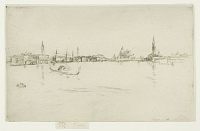Salute Dawn | ||
| Number: | 207 | |
| Date: | 1879/1880 | |
| Medium: | etching and drypoint | |
| Size: | 127 x 204 mm | |
| Signed: | butterfly at left | |
| Inscribed: | no | |
| Set/Publication: | 'Second Venice Set', 1886 | |
| No. of States: | 4 | |
| Known impressions: | 32 | |
| Catalogues: | K.215; M.212; W.185 | |
| Impressions taken from this plate (32) | ||
STATE
Four states are known before cancellation.
State 1

Signed with a butterfly near the left edge, below the centre.
There is a gondola below the sailing ship that is anchored to the right of the Doge's Palace.
State 2

The gondola is removed; fine, slightly curving horizontal lines are added to the water; a few horizontal and curved lines are added to the sky; the hull of the larger sailing ship, anchored to right of the Doge's Palace, is more clearly drawn and is shaded with vertical lines; fine horizontal and vertical drypoint lines--indicating reflections--are added below the sailing ship and some buildings on the horizon; many spots of foul biting appear at the upper left corner, and scattered spots of foul biting at upper and lower right.
State 3

Most foul biting is removed from the upper left corner, but a few spots remain on the right; additional lines indicating reflections are added below and to right of the sailing ship, below Santa Maria della Salute and below San Giorgio, on the right; there is a patch of fine horizontal and diagonal shading to right of the dome of San Giorgio.
The appearance of foul biting and accidental scratches varies on impressions, partly as the result of differences in inking and wiping the plate, but it is also likely that some of the worst scratches, which are clearly visible on one impression ( ), were burnished off before the last impressions of the state were printed.
), were burnished off before the last impressions of the state were printed.
 ), were burnished off before the last impressions of the state were printed.
), were burnished off before the last impressions of the state were printed.State 4

Fine shading on the sky, water, sailing ship and to right of the dome of San Giorgio is removed or worn away.
Kennedy thought the pale drypoint shading had been consciously removed. 9 However, it is visible under magnification on most images, so it is more likely that the fine lines became worn during the course of printing. In addition to wear, tiny spots of foul biting appeared as the plate was printed ( ), and the latest impressions of the state have a short, curved diagonal scratch on the sky, above the campanili to right of the sailing ship (
), and the latest impressions of the state have a short, curved diagonal scratch on the sky, above the campanili to right of the sailing ship ( ).
).
 ), and the latest impressions of the state have a short, curved diagonal scratch on the sky, above the campanili to right of the sailing ship (
), and the latest impressions of the state have a short, curved diagonal scratch on the sky, above the campanili to right of the sailing ship ( ).
).9: Kennedy 1910 (cat. no. 215 IV).
The fourth state as described here does not necessarily conform to the most strict definition of a new state. However, the effect without the fine shading is significantly different from the third state, and the fact that Whistler printed so many impressions without renewing the shading argues that he was still satisfied with the image.
Published in this state by Messrs Dowdeswell and Thibaudeau with the Twenty-six Etchings (the 'Second Venice Set') in 1886.

